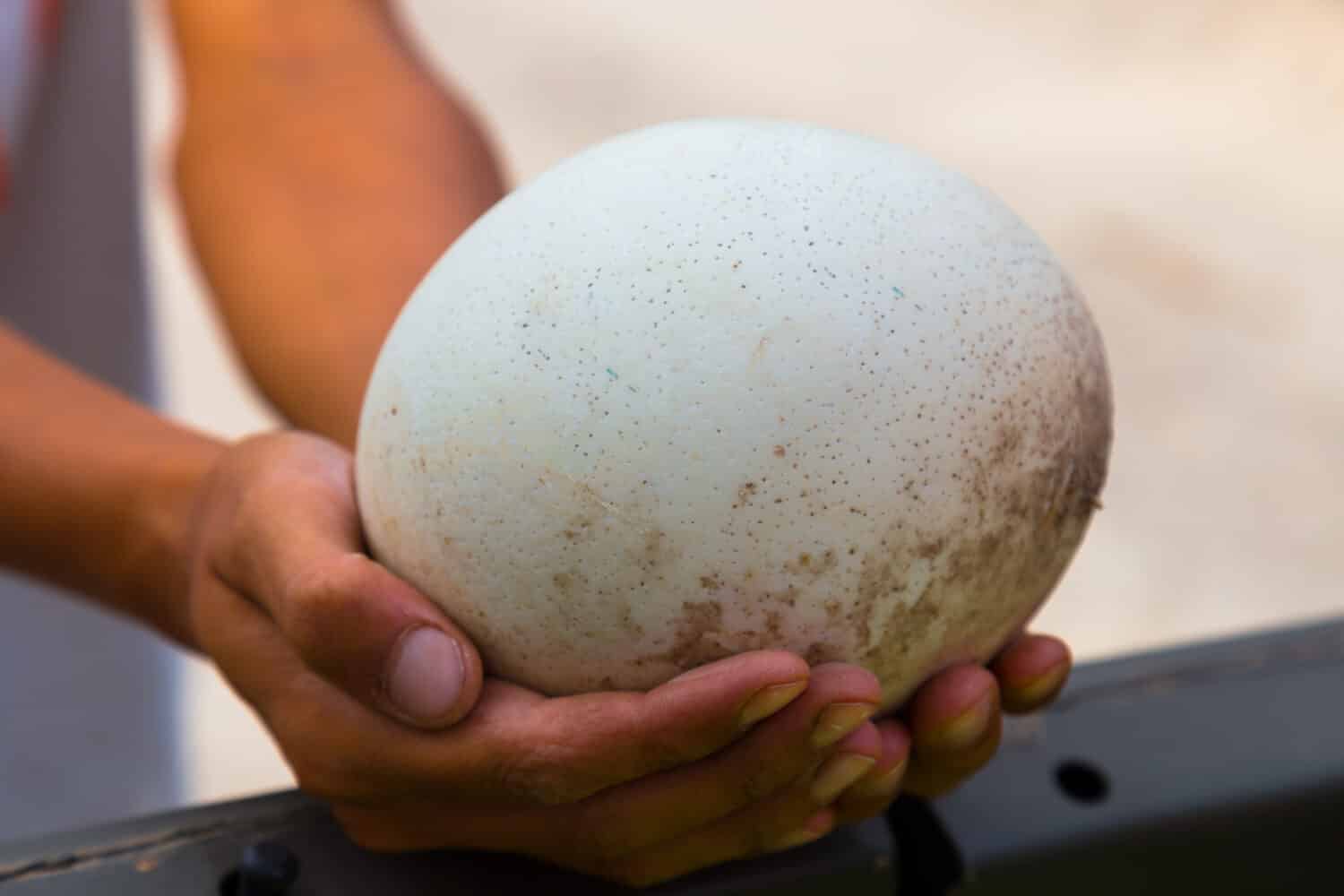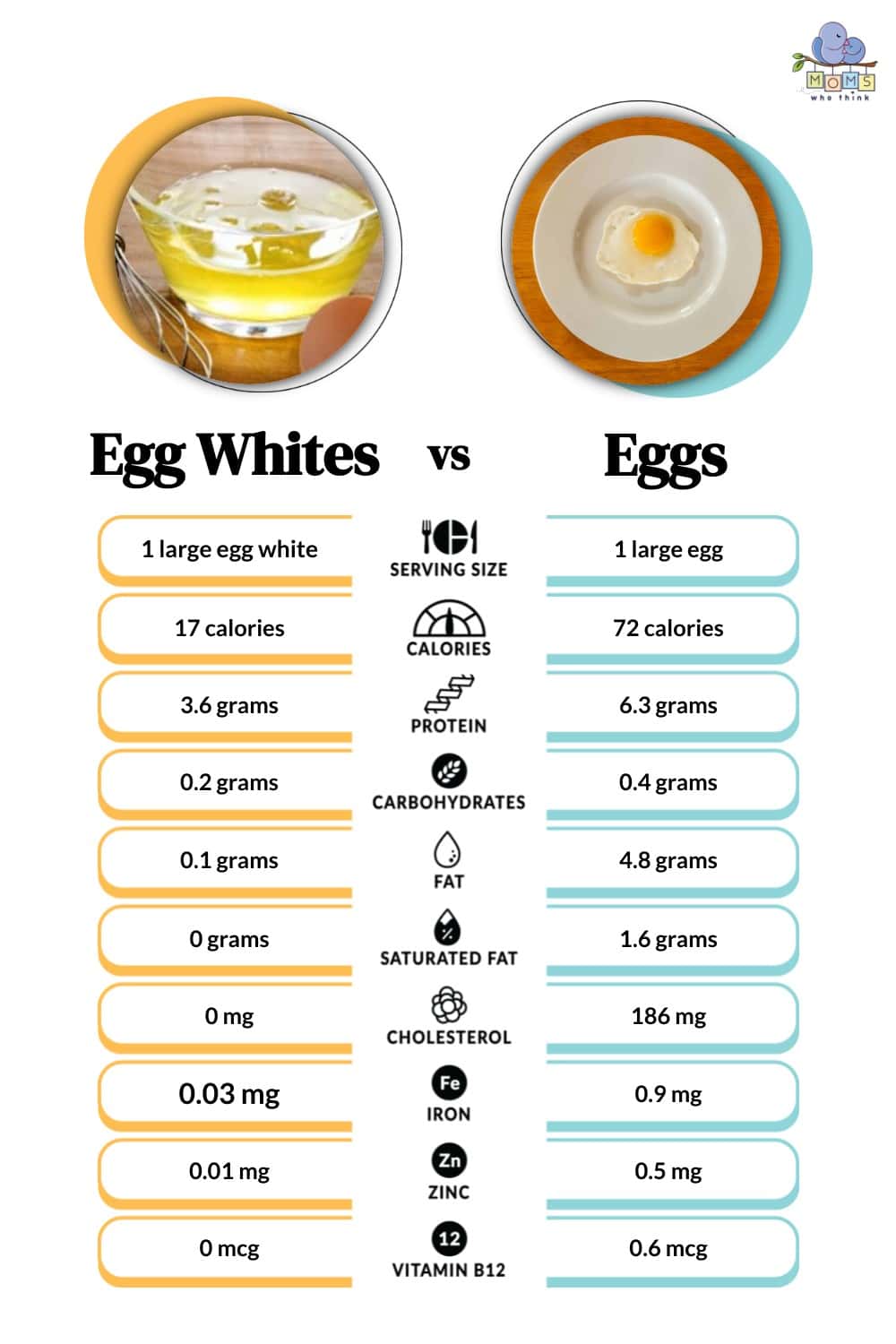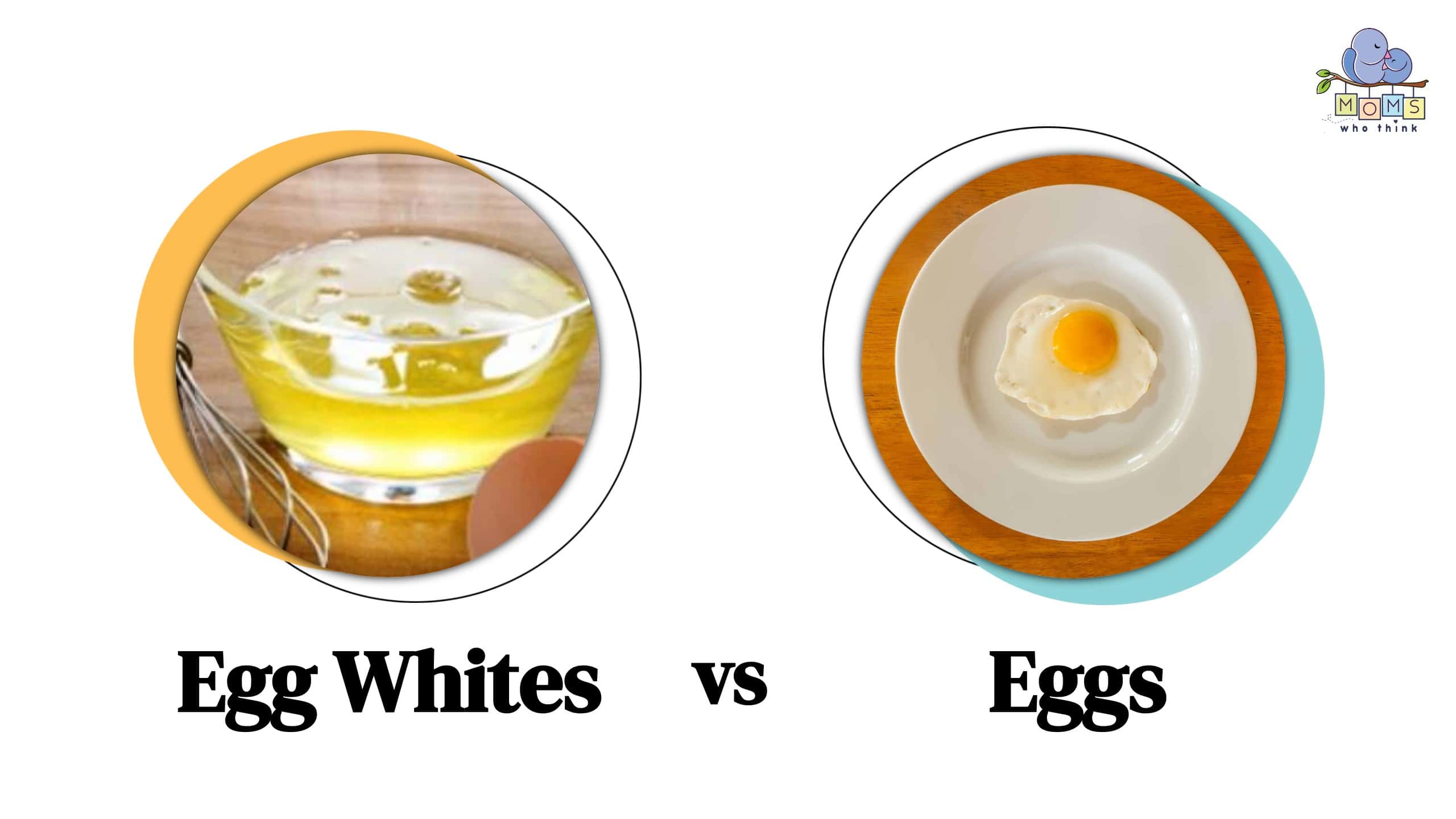Take a look at most breakfast menus at restaurants and you will see you have options for either egg whites or the whole egg. What are the key differences between egg whites vs. eggs? The short answer is yes. While egg whites are lower in calories and contain less fat and cholesterol, they lack the full spectrum of nutrients found in the yolk. The yolk, or yellow center part of the egg that’s shaped like a circle is a powerhouse of vitamins, minerals, and antioxidants.
And since chicken eggs are most common in the American market, this article will talk about key differences and health benefits of their eggs and more! It will also highlight other types of edible eggs. So, let’s dig into egg whites vs. eggs to better understand and make an informed choice between the two.
What Are Egg Whites?
This is the clear, viscous liquid part of the egg that surrounds the yolk or the yellow inner circular part of the egg. Egg whites are sometimes called “egg albumen.” Want to know why? It’s because “Albumen” is a fancy schmancy way of saying “white” in Latin. So, if ever you hear someone say “egg albumen,” then you know they are simply talking about the clear, jelly-like part of the egg that's not the yolk.

©iva/Shutterstock.com
So, “egg albumen” is really just “egg white.” Egg whites are primarily composed of water and protein and are known for their high protein content and low fat and carbohydrate content. Humans typically consume egg whites from chicken eggs, the most common and widely consumed type of egg whites. These egg whites come in various sizes, including small, medium, large, and extra-large, with large eggs being the most common size.
What Are Eggs?
For starters, eggs have two main parts: the clear part and the yellow part. As mentioned above, the clear part is known as the egg white. In the center, is what is known as the “egg yolk.” It is shaped like a yellow circle and contains things like fat, protein, vitamins, and minerals.
What’s the Difference Between Brown and White Eggs?
It all boils down to the feathers! Hens with white feathers usually lay white eggs, while those with brown feathers lay brown eggs. But when it comes to nutrition, brown and white eggs are the same unless the hens eat special food to make eggs with the health-boosting nutrient Omega-3.

©Africa Studio/Shutterstock.com
Egg Whites vs. Eggs: Types
Egg Whites
Chicken eggs are the most widely known eggs on the market in America. But there are other types of eggs from different bird species that can be eaten. These eggs may be less common and vary by region. So, depending on where you live, you may find them at local farms, farmer markets, and specialty grocery stores.
Duck Eggs are similar to chicken eggs but are larger and have a richer flavor. Their egg whites can be used in cooking and baking much like chicken egg whites.
Quail eggs are tiny compared to chicken eggs, but they have a delicate and slightly gamey flavor. They are often used in gourmet dishes and can be separated from their egg whites.
Goose eggs are larger than chicken eggs and have a unique flavor. While they have a thicker shell, their egg whites can be used in culinary preparations.
Turkey eggs are less common but can be consumed. They are larger than chicken eggs and have a milder flavor. Like other bird eggs, their egg whites can be used in various recipes.
Eggs
We just talked about how you can eat the egg whites from chicken, duck, quail, and turkey. Now let’s look at other types of birds that have edible eggs:
Pheasant eggs are relatively small and have a mild, gamey flavor. They are less common and may be used in gourmet or specialty dishes.
Ostrich eggs are enormous, equivalent to about 24 chicken eggs in size. They have a unique, rich flavor and are often used in large-scale cooking or as a novelty item due to their size.

©Valeriia Khodzhaeva/Shutterstock.com
Guinea fowl eggs are similar in size to chicken eggs but may have a slightly more robust flavor. They are used in cooking and baking, particularly in some African and European cuisines.
Turtle eggs are consumed in some cultures, primarily in parts of Asia and Central America. However, it's important to note that harvesting turtle eggs is illegal in many places due to conservation concerns.
Caviar anyone?
Fish roe consists of the eggs of various fish species, such as salmon, sturgeon, and trout. These eggs have multipurpose use as a delicacy in sushi, caviar, or as a garnish.
Egg Whites vs. Eggs: Cooking
Egg Whites
Whipping and Beating
This is where the creativity shines with egg whites! You can whip or beat them vigorously to make them fluffy like meringues, soufflés, and certain cakes. When you do this, they should form stiff peaks, which means they hold their shape when the beater or whisk is lifted.
Scrambling
If you are watching your calories, you may find this a great alternative to traditional scrambled eggs. Whisk them lightly and cook them in a pan. It’s quick and easy!
Poaching
This type of cooking egg whites is famous in dishes like Eggs Benedict. It involves carefully sliding the egg white into simmering water and cooking until set.
Omelets
You can use egg whites to make omelets to cut calories instead of whole eggs. They result in a lighter omelet too!
Custards and Sauces
The yolks of whole eggs are delicious in custards, sauces (like hollandaise for eggs Benedict!), and desserts to provide a creamy, thickening effect and a rich flavor.
Eggs
Frying
Whole eggs can be fried sunny side up, over easy, over medium, or over hard. The yolk remains intact, and the degree of doneness can vary based on personal preference.
Boiling
Whole eggs can be boiled to make hard-boiled or soft-boiled eggs. The cooking time determines the texture of the yolk, with longer cooking times resulting in hard yolks and shorter times yielding soft, runny yolks.
Baking
Whole eggs are a great go-to in various baking recipes to provide moisture, structure, and leavening. They contribute to the richness and flavor of baked goods like cakes, muffins, and quiches.
Egg Whites vs. Eggs: Nutritional Value

Egg Whites vs. Eggs: Which is Healthier
Egg Whites
If you're keeping an eye on calories and fat, egg whites are a great pick. Why? Because they're low in calories and full of protein. Plus, they have no cholesterol, which is good news if you're trying to watch your cholesterol intake.
Eggs
On the other hand, eggs bring more to the table in terms of nutrients. So while egg whites are healthy, if you want the whole gamut regarding nutrients, eggs are your better choice! They're rich in vitamins, minerals, and healthy fats, especially in the yolk. They still provide protein, but not as much per calorie as egg whites. And they do contain cholesterol, mainly in the yolk.
However, according to the Mayo Clinic, research suggests that the cholesterol in eggs might not have a big impact on blood cholesterol levels for most people.
Final Thoughts
Perhaps you – like so many – love eggs! They are so versatile in the kitchen from frying to baking. And you can try them in all sorts of dishes, like breakfast omelets and delicious cakes. It all boils down to your preferences and health goals. So, if you want a low-calorie, low-fat, high-protein option, then go for egg whites. But if you're after a nutrient-packed choice and cholesterol isn't a big concern, whole eggs with the yolk can be a nutritious addition to your diet. And if you're unsure, it's always a good idea to chat with a healthcare pro or a dietitian for personalized advice.

